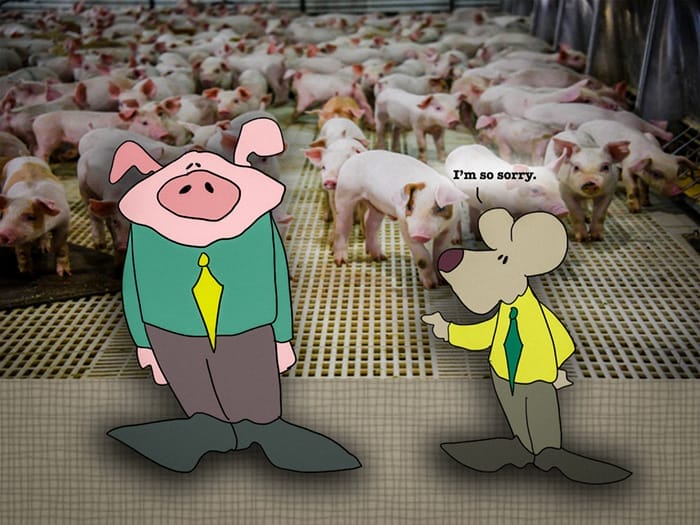Meat. Most of us eat meat. On average, 86 percent of people in the world partake.
I join in those ranks. A meat eater, I am. While I don’t eat much meat, I happen to enjoy all kinds. And then there is this. I’ve mentioned it before, but I have a problem with eating meat. I don’t like the fact that we have to kill animals in order to eat them. Most of them are killed in slaughterhouses.
We humans have been farming animals for thousands of years. Yet, the way we handle these animals has changed dramatically over the past century. Billions of animals have had to endure lives in factory farms. These “farms” are basically huge prison systems for animals. And the animals aren’t really treated as sentient beings anymore. There are no rolling green hills for them to stroll on, no crystal clear lakes for them to drink. They can’t snuggle their young or watch the clouds go by. They live in a prison, raised only for their meat. This makes me sad, as I wish things worked differently.
Yet there probably won’t be a change in this. And so we have those slaughterhouses.
Thankfully, for us — the insistent meat eaters — food regulations have been put in place in the United States. These “farms” and “slaughterhouses” are heavily regulated, we hope.
I’m thinking of all these things because of ‘The Jungle.’ It is a novel by Upton Sinclair, written in 1906. Today is the birthdate of Upton Beall Sinclair, Jr., on September 20, 1878. A fellow from Baltimore, Maryland, who would wind up writing more than 100 books in a wide variety of genres.
But back to this book, The Jungle. It is a muckraking account about the meat packing industry here in this country.
And ‘The Jungle’ set in motion the immediate passage of food-safety legislation in the U.S. A lot of bills had been floating around in Congress for decades, but nothing was ever passed. When Sinclair’s book came out, those bills were shoved forward into the public eye.
After President Theodore Roosevelt got wind of all this, he didn’t waste any time directing the U.S. Department of Agriculture to investigate Sinclair’s claims.
Rumors swelled that the book contained a lot of lies and exaggerations. But old Teddy didn’t really trust these stories. So he forged ahead with the investigations and found horrendous conditions in those slaughterhouses. Just as Sinclair described.
As a result, a slew of rules and regulations were passed by Congress, many of which still keep things in order today.
As mentioned, Sinclair wrote a lot of books, and many of them looked hard and long at corrupt systems:
The Jungle — Meat Industry
The Brass Check — Corrupt Journalism in the U.S.
King Coal — The Coal Industry
Oil! — The Oil Industry
The Flivver King — The Auto Industry
On and on he went. Sinclair won the Pulitzer Prize for Fiction in 1943 for Dragon’s Teeth (1942), the third novel in the series about the Nazi takeover of Germany in the 1930s.
Many of his novels can be read as historical works. He lived a long life, writing and investigating. He died on November 25, 1968, at the age of 90.
He spent his life exposing the wrongs that needed to be righted. I don’t know what kind of a man he was on the day-to-day of things, but his work was noble. Many tried to shut him down and publicly doubted his veracity. But he surged on in his truths.
The world needs more of this, I think. Now, more than ever.
As for my meat eating? For now, my guilt continues, and I pray I will be forgiven in the magnanimous Universe for ongoing offenses.
===========
“It is difficult to get a man to understand something, when his salary depends on his not understanding it.”
― Upton Sinclair, I, Candidate for Governor: And How I Got Licked
============
“Wrong does not cease to be wrong because the majority share in it.”
― Leo Tolstoy, A Confession
==============
“Facts do not cease to exist because they are ignored.”
― Aldous Huxley, Complete Essays, Vol. II: 1926-1929
===============
It is a jungle out there, and also, in me.
